Posted by Managementguru in Business Management, Technology, Web Development
on May 30th, 2023 | 0 comments
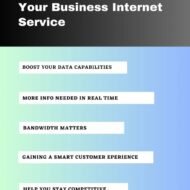
Having reliable and fast internet is critical for any business to function in today’s digital world, whether you’re in an office setting with multiple employees or a solo entrepreneur working from home. Yet, how do you know when it might be time to upgrade your current service? Should you stick with the same provider or start shopping for better deals? Today this article will explore some crucial considerations that should go into deciding whether now is the right time to move up your current business internet package. Research your options – compare the different types of internet services and find the one that best fits your needs In today’s fast-paced business world, reliable and versatile internet service is essential. With so many internet services available, it can actually be overwhelming to try and figure out which one is the best fit for your business needs. That’s why doing your own research ahead of time is so important. By comparing the options available to you, you can make an informed decision and confidently upgrade your business internet. Whether you’re looking for lightning-fast speeds, dependable connectivity, or robust security features, taking the time to research your options can help ensure that your business runs smoothly and efficiently. So don’t wait any longer – start exploring your internet service options today! Companies like Frontier are an excellent choice because they offer a variety of plans and packages. When it comes to finding exemplary internet service for your business, you want to make sure that you’re finally getting the most bang for your buck. That’s why doing some research ahead of time can be so beneficial. Companies like Frontier offer a variety of plans and packages, all tailored to fit different types of businesses and their specific needs. By looking into their various internet packages, you can often find the one that best fits your budget while still providing your business with the speed, versatility, and reliability it needs. Check for any promotional deals or discounts offered by internet providers Upgrading your business internet may seem like a daunting task, but it can be made more accessible by taking advantage of promotional deals and discounts offered by internet providers. Before making the switch, it’s essential to research and compare plans to ensure you’re getting the best deal. Many providers offer special promotions and discounts for businesses looking to upgrade their internet speed and bandwidth. By taking advantage of these deals, you can improve your business’s internet capabilities and save money in the process. Don’t hesitate to reach out to your current provider or explore other options to see what types of deals are available for your business. Understand what speed you need and make sure it matches the provider’s requirements As a business owner, you want to ensure that you have the right internet speed to meet the demands of your operations. Before you rush into upgrading your business internet, it’s essential to understand what speed you need and whether it matches your provider’s requirements. If you don’t take the time to assess your internet requirements, you risk overpaying for services that you don’t need or being stuck with a slow internet connection that hinders your productivity. So, take the time to understand your internet needs before you make any upgrades to ensure that you’re getting the best value for your...

Posted by Managementguru in B-Schools, Technology, Web Development
on Mar 29th, 2023 | 0 comments
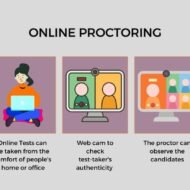
In today’s digital age, online exams and certifications have become increasingly popular. With the rise of remote work and e-learning, many individuals seek to enhance their skills and knowledge through online courses and certifications. However, the challenge with online exams is ensuring the credibility and authenticity of the test-taker. That’s where online proctoring software comes in. This blog post will explore the benefits of using online exam proctoring software for exam certification providers. What is a Proctoring Software? It is a tool that monitors and supervises online exams remotely. It ensures the integrity of the exam by verifying the test-takers’ identity, monitoring their behavior during the exam, and detecting any suspicious activities or cheating attempts. The software uses advanced technology such as artificial intelligence (AI), machine learning (ML), and computer vision to ensure that the exam is fair and accurate. Benefits of a Proctoring Software Convenient and Flexible One of the most significant advantages of using proctoring software is that it offers convenience and flexibility to the test-taker. They can take the exam from the comfort of their home or office at a time that suits them best. This eliminates the need for traveling to a physical testing center, saving both time and money. Secure and Reliable They provide a secure and reliable testing environment. It ensures that the test-taker is who they claim to be, using various identity verification methods such as facial recognition, ID scanning, and keystroke analysis. The software also monitors test-takers’ behavior during the exam, using AI and ML algorithms to detect suspicious activities or cheating attempts. Cost-Effective Using online proctoring software can be cost-effective for exam certification providers. It eliminates the need for physical testing centers, which can be expensive to set up and maintain. It also reduces the need for human proctors, as the software can monitor multiple exams simultaneously. This can result in significant cost savings for exam certification providers, allowing them to allocate resources more effectively and efficiently. Improved Accessibility This software improves accessibility for individuals with difficulty accessing physical testing centers. This includes individuals with disabilities, individuals living in remote or rural areas, and individuals who are unable to travel due to personal or financial reasons. The software allows them to take the exam from any location with an internet connection. Enhanced Exam Integrity Proctoring software enhances the integrity of the exam by detecting and preventing cheating attempts. The software uses advanced technology such as AI, ML, and computer vision to monitor test-takers’ behavior and detect suspicious activities. This includes detecting if the test-taker is looking away from the screen, using unauthorized materials, or communicating with another person during the exam. Immediate Results Using proctoring software can provide immediate results to the test-taker. The software can monitor the exam in real time, providing instant feedback on test-takers’ performance. This eliminates manual grading, which can be time-consuming and prone to errors. Online proctoring software also reduces the risk of cheating and ensures that the exam results are accurate and reliable. Environmental Friendly Remote proctoring software eliminates the need for physical testing centers, reducing the carbon footprint associated with transportation, electricity consumption, and other resources required for maintaining a physical testing center. Thus, it is an environmentally friendly solution for exam certification providers. To conclude, proctoring software is a powerful tool for exam certification providers, offering numerous benefits, including convenience, security, cost-effectiveness, accessibility, enhanced exam integrity, immediate results, and environmental friendliness. As more and more individuals turn to online courses and certifications, proctoring software will become increasingly important in ensuring the credibility and authenticity of online...

Posted by Managementguru in Business Management, Data Science, How To, Technology
on Mar 21st, 2023 | 0 comments
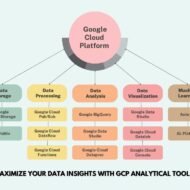
In today’s data-driven world, businesses must maximize their data to gain a competitive edge. With Google Cloud Platform (GCP) Analytics, businesses can analyze and gain insights from their data to make informed decisions and drive business growth. This blog will explore how businesses can maximize their data insights with gcp analytics. Understanding Google Cloud Platform Analytics Google Cloud Platform (GCP) Analytics is a suite of tools and services that allow businesses to collect, process, analyze, and visualize their data. This Analytics provides various solutions, including real-time analytics, data warehousing, and machine learning. With this data, businesses can make data-driven decisions, optimize business processes, and gain a competitive edge. Here are some ways businesses can maximize their data insights with Google Cloud Platform Analytics: 1. Collect and Store Data The first step to gaining insights from your data is to collect and store it in a centralized location. Analytics offers several data collection solutions, including Google Cloud Storage, SQL, and Bigtable. With Google Analytics, businesses can store data in a scalable and secure manner, making it easier to analyze and gain insights. 2. Process Data in Real-time Real-time analytics can give businesses valuable insights and enable them to make informed decisions quickly. Google Analytics offers several solutions for real-time analytics, including Google Cloud Pub/Sub, Google Cloud Dataflow, and Google Cloud Functions. With these tools, businesses can analyze streaming data in real time, quickly detecting and responding to issues. 3. Analyze Data Google Cloud Platform Analytics offers several tools for analyzing data, including Google BigQuery, Google Data Studio, and Google Cloud Dataproc. These tools allow businesses to analyze large volumes of data and gain valuable insights into customer behavior, business processes, and more. Businesses can identify trends and patterns by analyzing data, optimizing operations, and improving customer experience. 4. Visualize Data Data visualization is essential to data analysis, allowing businesses to communicate insights effectively. Google Cloud Platform Analytics offers several tools for data visualization, including Google Data Studio, Google Cloud Datalab, and Google Cloud Console. With these tools, businesses can create interactive dashboards, charts, and graphs, enabling them to communicate insights to stakeholders effectively. 5. Leverage Machine Learning Google Analytics offers a suite of machine learning tools, such as AutoML and AI Platform, which can help businesses extract valuable insights from their data. Businesses can easily build and deploy models that perform tasks such as predictive analytics, anomaly detection, and natural language processing using these tools. Machine learning can also help automate data cleaning and classification tasks, saving valuable time and resources. 6. Use Visualization Tools Google Cloud Platform Analytics offers a range of data visualization tools, such as Data Studio and Looker, which can help businesses present their data in a more engaging and intuitive way. These tools allow businesses to create interactive dashboards, reports, and charts that can be easily shared with stakeholders. Data visualization can help businesses uncover patterns and insights that might not be immediately apparent in raw data and can be particularly useful for identifying trends and making informed decisions. 7. Use Machine Learning Machine learning is a powerful tool for gaining insights from data and automating business processes. Google Cloud Platform Analytics offers several solutions for machine learning, including Google Cloud AutoML, Google Cloud AI Platform, and TensorFlow. With these tools, businesses can build custom machine-learning models and automate fraud detection, customer segmentation, and predictive maintenance tasks. In conclusion, gcp analytics is a powerful suite of tools and services to help businesses maximize their data insights. By collecting and storing data, processing data in real time, analyzing data, visualizing data, and using machine learning, businesses can gain valuable insights into customer behavior, business processes, and...

Posted by Managementguru in Cyber Security, E Commerce, Financial Management, How To, Online Shopping, Technology
on Mar 12th, 2023 | 0 comments
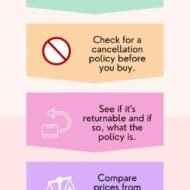
Research the Company Before Purchasing One of the most important things to remember when shopping online is to do your homework. It is critical to ensure that the company is trustworthy and reliable. Take your time reading other customers’ reviews and researching the company’s history. This can assist you in determining whether or not a company is a good fit for you. By conducting your research, you can ensure that your purchase is secure and that you will receive the product you desire. Take Advantage of Sale Days Online shopping can help you always get the best deal. Take advantage of sale days such as Black Friday and Cyber Monday, as well as special promotions. Companies are offering discounts and deals on their products that you will not find at any other time. Sign up for newsletters and use tools like price-tracking websites to stay on top of the best sales. In addition, some stores will match prices if they find the same items cheaper elsewhere. So, spend a few minutes researching the items you want and seeing if you can get a better deal online. It may be tempting to do a quick digital shopping trip on Amazon while sipping a latte at your favourite coffee shop, but if you use public Wi-Fi, you risk compromising your data and financial information. If you’re using an unsecured Wi-Fi connection, you may be sending sensitive data without realising it. Patient hackers who have connected to the same Wi-Fi network are looking for opportunities to steal data from public users. If you’re on the go and can’t get home before you buy, she recommends using your mobile data plan and avoiding public Wi-Fi entirely. If you must do some online shopping while out and about, consider investing in a virtual private network (VPN), which is typically more secure than public Wi-Fi. However, we strongly advise you to wait until you get home before making a purchase. Create an Online Shopping Budget Online shopping can be a great way to save money and find great deals, but remember to set and stick to a budget. Always ask yourself if you really need it before making a purchase, and then consider how much you can afford to spend. This will assist you in avoiding impulse purchases, which can quickly add up. Check for Discount Codes and Coupons Many online stores provide discounts and special offers on their products, but you may have to look for them. Take a few minutes before making a purchase to look for discount codes online. You can look for these codes on the store’s website or through coupon websites. This way, you can save money and get the best deal possible on your purchase. Take Advantage of Free Shipping Offers One of the many advantages of shopping online is that many stores offer free shipping if certain conditions are met. For example, you may be eligible for free shipping if you spend a certain amount of money, purchase a certain number of products, or simply sign up for their newsletter. Taking advantage of these deals can help you save a lot of money, so check the store’s website before making a purchase to see if you can get free shipping. Shop on trusted websites It’s unavoidable—there will come a time when you’ll be shopping online for something and come across a site that looks…off. If you’ve ever come across a website that makes you nervous, trust your instincts. Many websites have been created with the sole purpose of defrauding online consumers and taking advantage of our desire to get a good deal. Consumers should ensure that the web...

Posted by Managementguru in Business Management, Data Science, E Commerce, Technology
on Sep 19th, 2022 | 0 comments
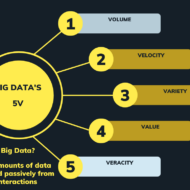
The combination of data analytics and cloud computing is so potent that it may boost business income while lowering investment expenses. There is little doubt that the rise of e-commerce or electronic commerce has completely changed the operating models of firms across industries. MSME’s are the backbones of an economy MSME or micro, small, and medium firms have been the backbone of the Indian economy- creating jobs and contributing considerably to the country’s GDP. “Without big data analytics, companies are blind and deaf, wandering out onto the web like deer on a freeway.” Geoffrey Moore Small businesses in particular have discovered a new way to sell their products and services as well as broaden their reach to include people from all across the country and across borders. Introduction of the internet and e-commerce platforms has greatly expanded the breadth of these businesses’ clientele. Use Data Analytics to track return on investment Data analytics another digital development have made it possible for MSMEs to track the return on investment – R O I . Businesses can obtain and analyse crucial client data, such as time spent on each web page, orders placed, and transactions made over time. This assists them in making necessary changes to their marketing plan/ product listing etc. As a result, they can improve the whole consumer experience. What is predictive analytics? Predictive analytics is the science of converting data sets into forecasts and decisions. It is a subset of advanced analytics that uses current data points to estimate the possibility of specific events and provide company leaders with a blueprint to follow. Predictive analytics technologies can be used to predict the success of future products, reduce customer turnover, and detect and prevent fraud. Every firm from apparel retailers to aeroplane manufacturers needs to be able to turn data into actionable insights in order to survive and...










